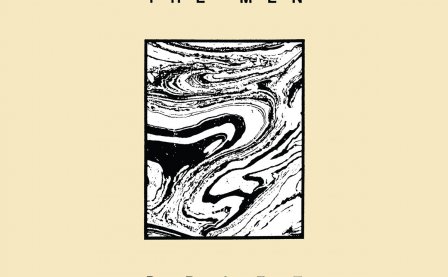In an attempt to figure out the mode of preference for what is formally abstract vs. what is formally concrete, the research almost inherently illuminates a cyclical process. Irony or sincerity: a default of human processing to create forms out of rejection, only to then prefer the previous forms in another rejection. Is there a way to transcend this? Is the cycle of presentation an unending loop? Do simplified metaphors even apply? Who’s to claim that their transgressions are even their own? I present the argument, but I see the fallacy in my own presentation.
Great works of art have been made under both personal drives in the spectrum of the anachronist vs. the futurist. The update of technologies spurned anger into artists that allowed for focuses of their vision: Charlie Chaplin refusing sound so as to perfect his form of visual expression. But this is precisely what Tomorrow’s Hits isn’t. Daft performers would project their borrowed philosophies onto the listener, claiming the anguish against what they see our current age as: an age of hyper-reflection. Then, leaving you with their mess, they claim, “But I am a product of Passion; this is now your mess to clean up!”
But I instead see the current age as a hybrid of Passion and Reflection. Acts committed become folded into the sea of a thousand pieces of information, placed before the eyes of an unable, anxious consumer. It’s no wonder that every now and then someone commits themselves to their own asylum, shutting into their favorite albums with signifiers they easily recognize and can get lost in, parting out their thoughts within the space, curled in a ball, on the floor, headphone cord wrapped around their knees. Romance now exists with review, and both are in a hyper state of extraction. The properties of momentum can’t be halted.
If they could, perhaps one should shove a boulder into The Men’s path. This is a Passion band in need of reflection. Part of what made them so appealing was that they used to give us everything and nothing. For example, much was fussed over their “analog sampling” of Spacemen 3 on Leave Home. Was it deliberate or off the cuff? Was it meant to gesture toward their influences or destroy them? Was this signifying a sacred entity in an act of profanity? Or was it the eventuality in the process of a finite language? Any conclusion seemed appropriate; it seemed both beyond and behind to think such anyway, as it alluded more toward the moment than anything else. “This is our mess, now we can see either sort it or leave it.”
But over the short span of an album-a-year output, it seems that the general draw has been to understand the band “on their own terms,” which ironically is an abstraction in itself. Is Tomorrow’s Hits the line in the interpretive sand? Is it, “Get behind these records we love, or get the fuck out?”
I understand these records though, and it makes the listening experience even worse. It’s hard to take the energy of a band that puts its acceleration into what sounds like Rolling Thunder Revue-era Dylan (albeit with far worse lyrics), when in its time the real deal could have killed you just as efficiently. Even now, both having never been there and looking back on history, the raw qualities of the rock sound better than the gem that emerges from Passion’s tumbler. “Different Days” is by far the most exciting song here, and this is so because it sounds more like themselves than their influences — a frenetic, angst-ridden blur of sonics and expressions whose scrappiness feels balanced by the ability of the band to perform so well as a rhythmic group. However, their attempts to sound older than themselves (“My ma gave me this guitar/ 1974 it’s true”), to provide counter-melody to their unified rhythm (horns on “Another Night”), or to draw out attention to the lyrics and their muse (“Get What You Give”) all sound like someone else’s experiments. These things don’t provide a challenge to either the band or the listener and come come across as methodic in whichever mirror you choose to view it in. It’s their “highest fidelity album yet,” but it actually being medium rare-fi in the grand relative scheme of the music fidelity scale seems boring.
For a band that experienced rapid transformation in a short span, this seems to be where they have settled, head nestled in Tom Petty’s bosom. The complexity fighting simplicity (the mess of guitars on Open Your Heart’s “Please Don’t Go Away” contra its repeating, single lyrical line) seem almost gone for good. If they were forsaken in the name of personal growth and rejection (and since this is speculative, this could actually be the reality), then it could feel like a challenge. Rather than seeming like the vaguely familiar voice in a new territory or changed landscape (as the change between Leave Home and Open Your Heart felt), Tomorrow’s Hits is like the accidental tale of the tragedy of American bands more familiar with creating than seeing. The constant road, the repetitions, the desire for familiarity (even as the unfamiliar becomes the norm) all contribute to the transition into one great jam band.
It’s interesting to hear an album fight its formalities. This is what made New Moon attractive, even if it left the desire to want more from its own thesis. When a record owes itself to neither its experiments nor its formalities, it procures the essence of transcending neither. Sincerities fight with inherent ironies present both in the world and in expression, and in the captured moment, we are left with a space whose limits are permanently out of touch. This is why we return to these records; this is its life after the author. But on Tomorrow’s Hits, we place our hands against the walls, we feel the familiar texture of recording studio foam, we lift ourselves up gently only to drop back down to the ground, actions of a bored child. Then we joke, “I guess my dad will really like this record.” Then we leave.
More about: The Men




